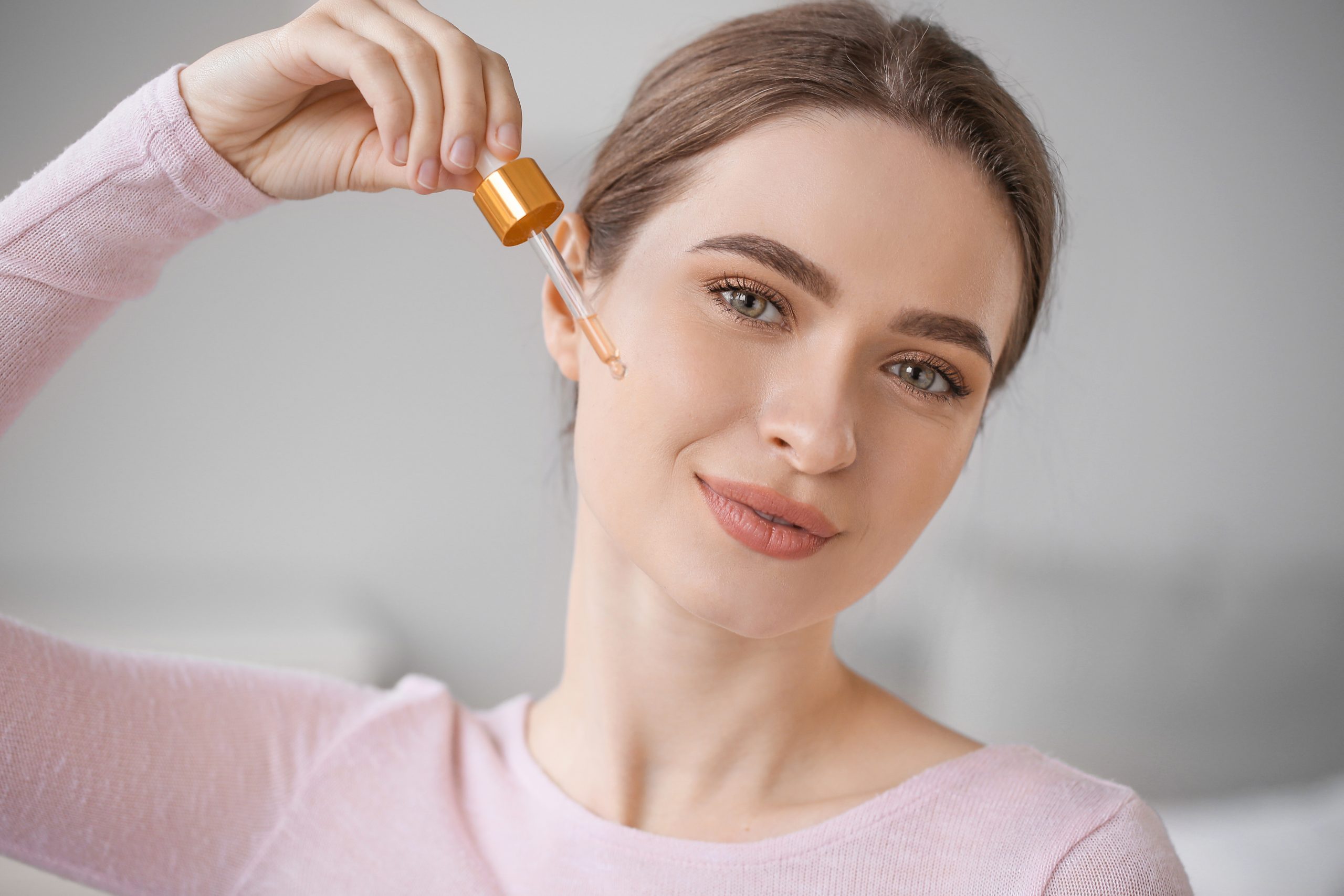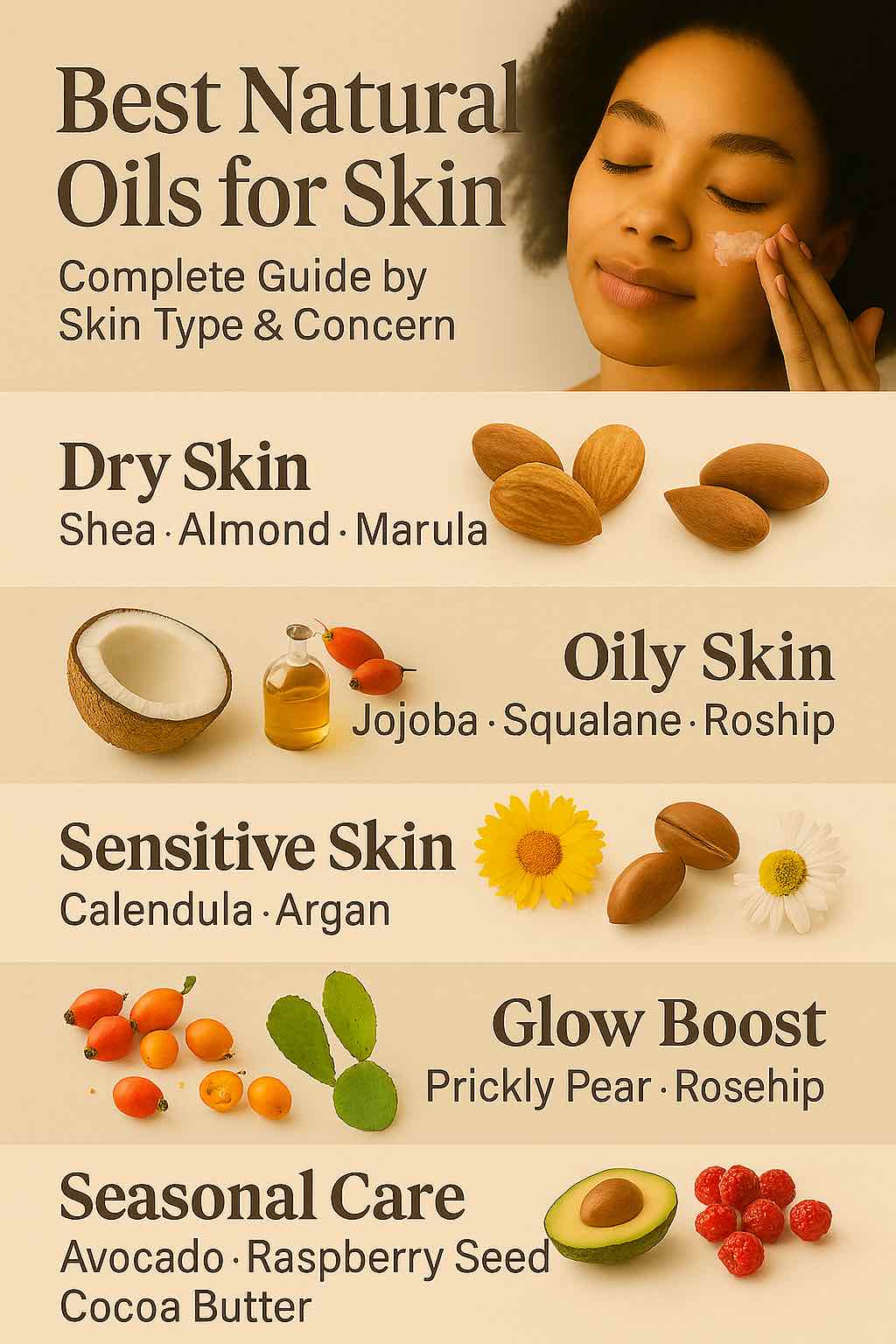
If you’ve ever stared at a crowded bathroom shelf and thought, there has to be a simpler way, you’re absolutely right. Skincare doesn’t have to be complicated to be effective. In fact, when you pick the right natural oils for skin, you can build a routine that is gentle, affordable, and beautifully minimal. These oils—pressed from seeds, nuts, flowers, and fruit—are rich in fatty acids, vitamins, and antioxidants that soften, soothe, and protect. Moreover, they play nicely with what you already own. Add a few drops after your serum, mix a little into your cream, or massage them onto damp skin post-shower and call it a day.
In this long, friendly guide, we’ll explore why natural oils for skin work so well, how to choose them for different concerns, and exactly how to use them so you feel glowy—not greasy. Along the way, you’ll find tiny recipes, day-to-night routines, and myth-busting tips that keep things honest and practical. Ready? Let’s turn your routine into something softer, calmer, and more you.
Why natural oils for skin often outperform complicated routines
First, a quick primer. Skin loses water to the air all day (that’s transepidermal water loss). Humectants like glycerin pull water in; natural oils for skin help seal it there. In other words, they don’t hydrate on their own—they lock hydration in place and smooth the tiny spaces between skin cells so your barrier feels comfortable again. Consequently, your face looks bouncier, your body feels less itchy, and everything in your routine works better because your barrier isn’t fighting fires. (DermNet — Occlusives reduce evaporative water loss).
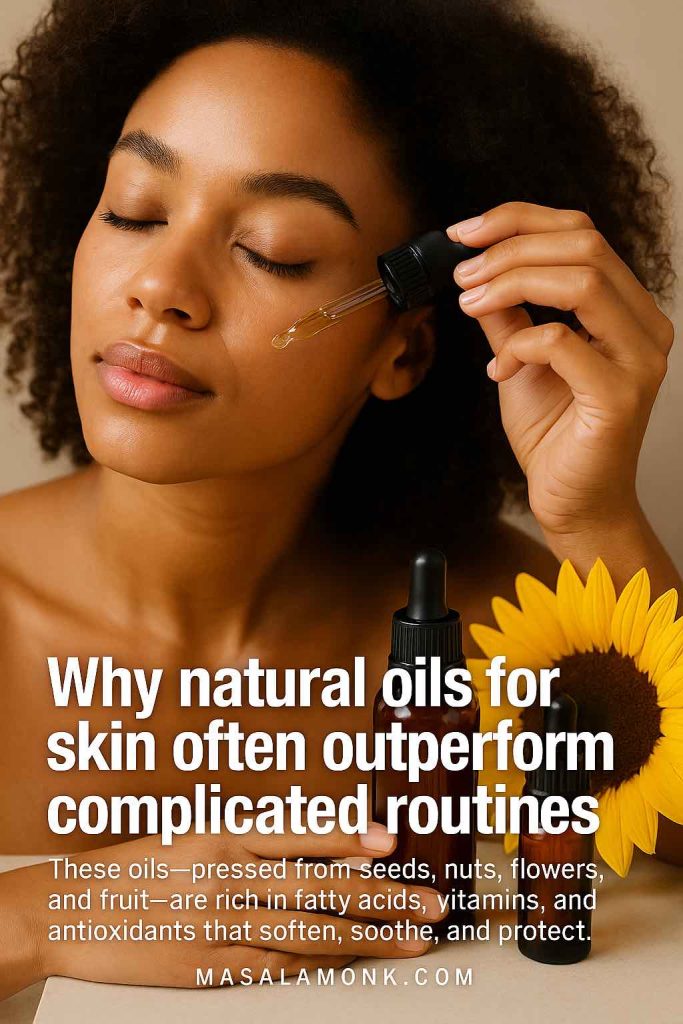
Additionally, plant oils bring bonus nutrients. Linoleic-rich options (sunflower, safflower, rosehip) replenish barrier lipids. Antioxidant-heavy picks (sea buckthorn, prickly pear, marula) help skin look brighter and more resilient. Calming macerates (calendula, aloe) visibly quiet down cranky cheeks. And yes, when you choose wisely, they do this without the sting or fragrance burn many people get from complicated formulas.
Most importantly, oils invite a slower pace: palms, breath, pressure. That 30-second massage at night isn’t just skincare; it’s a tiny nervous-system break you’ll actually look forward to.
Do read out latest post on : Turmeric Benefits for Skin and Face
Warning: This is general education article and not medical advice or professionally approved piece, kindly be careful, patch test, or consult qualified professionals before testing out anything you find in this post.
How to pick natural oils for skin by skin type (quick cheat sheet)
- Dry/tight: shea butter (body), cocoa butter (body), olive, almond, marula, squalane (face).
- Oily/acne-prone: jojoba, squalane, rosehip, black cumin seed; tea tree diluted for spots.
- Sensitive/reactive: squalane, sunflower; try calendula macerate and patch test.
- Eczema-prone: shea (body), sunflower, squalane (face), calendula; lanolin on rough, cracked areas.
- Dull/uneven tone: rosehip, sea buckthorn, prickly pear; optionally carrot seed (always sunscreen by day).
- Large pores/shine: jojoba and squalane balance sebum; lightweight textures help makeup sit better.
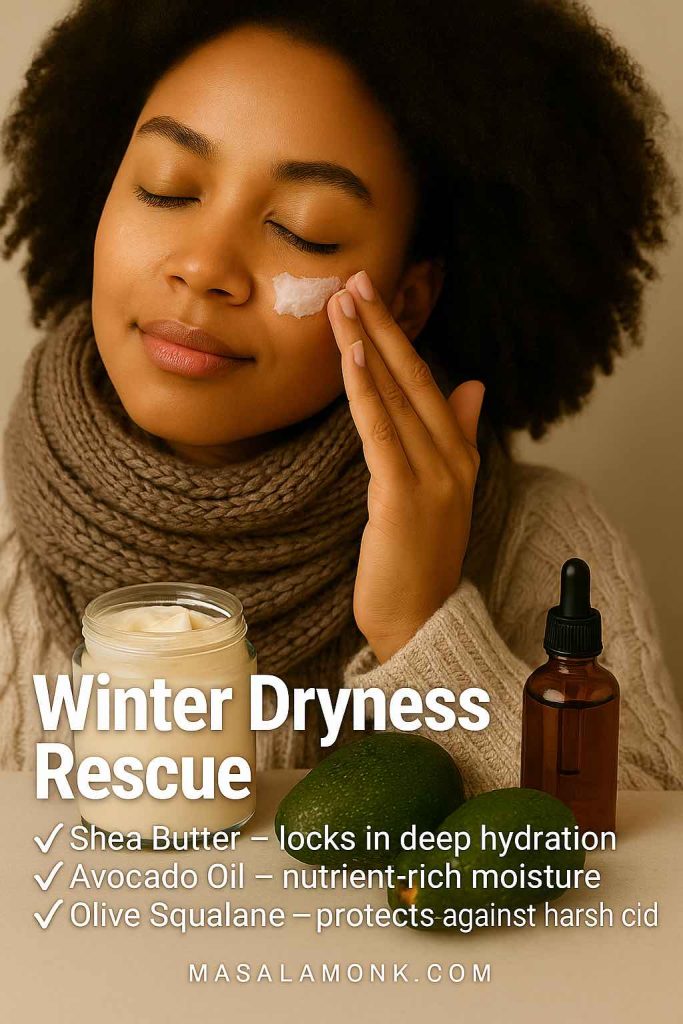
We’ll go long on the individual oils next; keep this list handy.
Note: In adults, sunflower preserved barrier and improved hydration, while olive oil damaged barrier with repeated use—so favor olive for cleansing or body only if you tolerate it. (PubMed — Sunflower preserved barrier; olive oil impaired it (Danby 2013)).
Meet the heroes: best natural oils for skin (what they do & how to use them)
Shea Butter — Natural Oil for Deep Moisture & Eczema-Prone Skin
Thick, plush, and soothing, shea butter behaves like a comforting blanket for thirsty skin. Thanks to stearic and oleic acids plus vitamins A and E, it softens rough texture while visibly easing dryness and itch. Because it’s occlusive, it excels on bodies—legs, elbows, heels—and on faces that tolerate richer textures in winter. (DermNet — Occlusives & moisturisers explained).
How to use: After bathing, when skin is still damp, warm a pea-size in your palms and press into dry zones. For a lighter feel, blend 2 parts shea with 1 part jojoba or squalane and whip briefly.
Good for: Dry, ashy limbs; eczema care; hands that wash often.
Also Read: Shea Butter for Scalp Psoriasis
Jojoba Oil — Best Natural Face Oil to Balance Oily or Acne-Prone Skin
Technically a liquid wax, jojoba’s wax-ester profile closely resembles human sebum, which explains its quick, light feel and “balancing” reputation. (NIH/PMC — Jojoba in dermatology (review)). Moreover, it makes a stellar makeup remover and the ideal carrier oil for tea tree oil.
How to use: For daily moisture, press 2–3 drops onto damp skin. For oil cleansing, massage 1 teaspoon over a dry face for 60 seconds, emulsify with damp hands, and remove with a warm cloth.
Good for: Combination and oily skin, congested T-zones, anyone who wants “light but effective.”
Here you might want to read more about Jojoba Oil for Skin.
Squalane — Lightweight Natural Oil for All Skin Types
Plant-derived squalane is the “disappearing act” of natural oils for skin: weightless, elegant, and widely tolerated—even by reactive complexions. It cushions dehydrated skin without a film and layers under sunscreen seamlessly. (NIH/PMC — Squalene/squalane: background & stability).
How to use: Press 2–4 drops over your hydrating serum or gel cream, morning or night.
Good for: Absolutely everyone; especially those who dislike the feel of oil.
Rosehip — Brightening Natural Face Oil for Tone & Texture
This linoleic-rich, quick-absorbing oil supports a more even look over time. With steady use, post-blemish marks soften and fine lines appear less prominent.
How to use: At night, apply 2–3 drops before or after moisturizer.
Pro tip: Pair morning vitamin C (or niacinamide) with evening rosehip for a simple, effective glow plan.
Interested knowing more about Rosehip Oil? Do read our post: Rose Hip Seed Oil: Unlock the Beauty and Wellness Benefits for Your Skin.
Sea Buckthorn — Antioxidant-Rich Plant Oil for Resilient Skin
Naturally orange from carotenoids, sea buckthorn lends that “I sleep and hydrate” glow. It supports elasticity and helps calm visible redness, making complexions look more alive. (NIH/PMC — Sea buckthorn oil: bioactive profile & antioxidants).
How to use: Mix a tiny drop into your night oil or cream (it can stain).
Good for: Dull, wind-exposed, or mature skin; chapped lips.
Learn more about What is Seabuckthorn? All Your Questions Answered.
Prickly Pear Seed — Luxury Natural Oil for Eyes, Fine Lines & Glow
Ultra-high in vitamin E and polyphenols, this silky elixir feels refined, not greasy. Consequently, it’s a favorite for the delicate eye area and for softening the look of fine lines. (NIH/PMC — Opuntia seed oil: tocopherols & phytosterols).
How to use: Pat one drop under each eye; or smooth two drops across the face at night.
Good for: Dehydrated zones that need plushness without weight.
Coconut — Classic Natural Body Oil for Very Dry Skin
Rich in lauric acid, coconut is wonderfully occlusive on the body, sealing in moisture and easing roughness. However, faces prone to clogging may find it too heavy. (PubMed — Virgin coconut oil vs mineral oil in AD).
How to use: After showering, massage a small amount into damp arms and legs; use as a pre-shampoo hair mask when ends feel crispy.
Skip for: Acne-prone facial skin.
Here we should point you towards Coconut Oil for Skin: Frequently Asked Questions
Olive — Heritage Natural Oil for Body Hydration & Oil Cleansing
Extra-virgin olive oil brings antioxidants and a plush feel to organic body oil routines. Additionally, it dissolves makeup beautifully when used as a cleansing step. (PubMed — Olive vs sunflower on adult skin barrier).
How to use: A teaspoon for oil cleansing; a thin sheen on damp shins. If it feels heavy, cut 1:1 with squalane.
Good for: Dry limbs, quick DIY scrubs (olive oil + sugar).
6 Health Benefits of Olive oil for Skin is where we cover more about this one. Do read.
Sweet Almond — Gentle Natural Oil for Sensitive Skin & Massage
Light, smooth, and packed with vitamin E, almond oil is a crowd-pleaser for easily irritated skin. It slides well for facial massage and blends effortlessly with creams.
How to use: Massage 2–3 drops into damp skin; or add a few drops to your body lotion to increase richness.
Note: Avoid if you have nut allergies.
Wanna learn more about Almond Oil for Skin? Do not miss reading our blog post on the same.
Calendula Infused Oil — Soothing Natural Oil for Irritated, Red Skin
Calendula petals macerated in a carrier (like sunflower) create a calm-inducing oil that feels like a sigh of relief. Therefore, it’s perfect after waxing, shaving, or long sun-and-wind days.
How to use: Tap a few drops over areas that look flushed; or blend 20–30% calendula into your daily oil.
Good for: Eczema-prone patches; post-shave sting.
Sunflower Seed — Barrier-Repairing Natural Oil for Eczema & Everyday Use
High in linoleic acid, sunflower supports a resilient skin barrier and rarely feels greasy. It’s baby-safe and deeply versatile across face and body. (PubMed — Sunflower improved hydration; olive impaired)
How to use: For body, a teaspoon on damp skin post-shower; for face, 2–3 drops at night.
Pairs with: Calendula for a simple, fragrance-free comfort blend.
Btw, as it’s a edible oil as well, know more about Sunflower Seeds Benefits for Weight Loss: Harnessing Nature’s Power.
Sesame — Ayurvedic Natural Body Oil for Warmth & Circulation
A traditional favorite for abhyanga (self-massage), sesame feels grounding and restorative. It’s slightly heavier, yet deeply nourishing.
How to use: Warm a small pool between palms; apply long strokes toward the heart. Shower or towel-blot after if you prefer a lighter finish.
Good for: Night rituals, colder seasons, tight shoulders.
Liquid Gold: 5 Benefits of Sesame Oil for Skin Care is where we explore more about Sesame Oil and its role in skin care.
Marula — Silky Natural Oil for Smooth Makeup Days
Marula offers slip without shine, so foundation glides on and clings better. It also softens flaky spots that sabotage base products.
How to use: One or two drops pressed in before sunscreen and makeup.
Good for: Normal to dry skin that wants a refined, non-greasy glow.
Babassu — Breathable Natural Oil for Summer & Combo Skin
Think of babassu as coconut’s airy cousin—melts on contact but leaves less residue. As a result, it suits faces that dislike heavy occlusives.
How to use: Swap for coconut anywhere you want a lighter touch; lovely for summer body care.
Good for: Combo skin; humid climates.
Black Cumin Seed — Clarifying Natural Oil for Blemish-Prone Skin
With thymoquinone and an earthy profile, this plant oil brings a calming, balancing vibe to fussy pores and flaky scalps. Emerging evidence—including an RCT—suggests topical Nigella sativa preparations can help mild-to-moderate acne. (PubMed — Topical black seed oil helpful in acne).
How to use: Blend one drop into jojoba or squalane and smooth a thin layer at night; can also be massaged into the scalp before washing.
Good for: Oil-heavy T-zones, stubborn little bumps.
Pumpkin Seed — Fortifying Natural Oil for Transitional Seasons
Mid-weight and quietly nourishing, pumpkin seed oil offers vitamin E comfort without heaviness. It’s a reliable “shoulder season” pick when skin can’t decide.
How to use: Mix 1 drop pumpkin with 2 drops squalane for a balanced finish.
Good for: Normal/combination skin; autumn and spring.
Learn more about The Benefits of Pumpkin Seeds for Weight Loss and Blood Sugar Control.
Lanolin (or Lanolin Oil) — Natural Occlusive for SOS Dry Spots
Although not a plant oil, lanolin earns a place in natural oils for skin routines for its unrivaled moisture-locking power. (DermNet — Contact reactions to lanolin).
How to use: Over damp skin, tap a grain-of-rice amount on cracked knuckles, lips, or heels; leave overnight.
Note: Not vegan; patch test if sensitive.
Cocoa Butter — Natural Body Butter for Long-Lasting Protection
Firm at room temp, cocoa butter melts into a rich, protective layer. It’s a winter workhorse and a classic in stretch-mark care. A classic occlusive seal—great over damp skin in winter. (DermNet — Occlusives & moisturisers explained).
How to use: Melt between palms and press onto damp skin. For a lighter whip, blend with babassu.
Good for: Legs that drink lotion and still ask for more.
Carrot Seed (Essential) — Antioxidant Natural Oil Add-In (Always Diluted)
Carrot seed essential oil is potent and best viewed as an add-in, not a base. It lends subtle radiance over time when used sparingly.
How to use: Keep face leave-ons at 0.5–1% (≈1–2 drops per 2 tsp carrier oil).
Important: Despite the rumors, it’s not a sunscreen. Wear broad-spectrum SPF 30+. (American Academy of Dermatology — How to select a sunscreen).
Tea Tree (Essential) — Antimicrobial Natural Oil Add-In for Blemish Spots
Tea tree is the classic plant extract for targeted blemish care. Nevertheless, it’s strong—so dilution is non-negotiable. A randomized trial supports 5% tea tree gel for mild–moderate acne; always dilute and use only on spots. (PubMed — 5% tea tree gel improved acne).
How to use: For tiny spots only: 1 tablespoon jojoba + 6 drops tea tree; dab once daily max.
Skip for: Broken skin or undiluted use on the face.
Read about Tea Tree Oil for Scalp Eczema and Psoriasis.
Aloe Infused Oil — Cooling Natural Oil for Post-Sun & Sensitivity
An aloe macerate brings a gentle, cooling glide to natural face oil blends. It doesn’t replace aloe gel; instead, it adds comfort to oils that might otherwise feel too plain.
How to use: Add 10–20% aloe macerate to jojoba or sunflower; press onto warm, damp skin after a day outdoors.
Good for: Mild after-sun care, fussy cheeks.
Vitamin E Oil — Antioxidant Booster for Any Natural Face Oil
Think of vitamin E as your blend’s bodyguard and soft-focus filter. It helps stabilize oils and adds a hint of cushion.
How to use: Add just 0.5–1% to DIY blends; more can feel tacky.
Good for: Extending freshness of rosehip/sea buckthorn mixes.
Argan — Everyday Natural Oil for Shine, Softness & Frizz Control
Beloved for hair, argan is also a steady everyday face oil: not too heavy, not too light.
How to use: 2 drops for face at night; smooth a half-drop across hair ends to tame frizz.
Good for: Normal/dry skin, multitaskers who want one bottle for face + hair.
Kukui — Lightweight Natural Oil for Sun-Parched Skin
Hawaiian kukui absorbs quickly and comforts skin that feels tight after sun or wind.
How to use: Press 2–3 drops on damp skin; mix with rosewater first for a soft, cushiony finish.
Good for: Travelers, beachgoers, anyone in dry wind.
Concern-Based Picks: Best Natural Oils for Skin by What’s Bugging You
Because skin behaves differently under stress, it helps to match natural oils for skin to the exact problem you’re seeing. Below, you’ll find, step-by-step routines (AM/PM), easy blends, timing expectations, and gentle do’s/don’ts.
Patch-test new products first using an open-application method. (DermNet — Open application (ROAT) test).
Eczema, Dermatitis, or “My Skin Is Mad at Me” (Calm + Repair)
When flares hit, natural oils for skin should be barrier-first and fragrance-free. Think comfort over excitement.
Why these help (briefly):
- Sunflower seed oil (linoleic-rich) supports the lipid matrix, so moisture stays in.
- Squalane cushions without sting or heaviness.
- Calendula infused oil visibly soothes the look of redness and itch.
- Lanolin locks in water on tiny cracked zones.
AM flow (gentle and quick):
- Rinse with lukewarm water only (no foaming cleansers on flare days).
- Mist or pat on a hydrating toner (optional but helpful).
- Press 2–3 drops squalane (face) or sunflower (face/body) onto still-damp skin.
- Finish with your unscented cream if you need more cushion; then SPF.
PM flow (comfort ritual):
- Short, warm—not hot—shower.
- Pat skin barely dry; leave it dewy.
- Mix 4 parts sunflower seed oil + 1 part calendula in your palm; press over face/body.
- Finally, dot lanolin only on cracks (lips, knuckles, heels). Pajamas on. Sleep.
Tiny weekly rhythm:
- Nightly oils for 7 days → assess. Often the “angry” look softens by day 4–5.
- Afterwards, maintain with PM oils 3–5 nights/week.
Do / Don’t:
- Do keep formulas bland for now.
- Don’t use undiluted essential oils on the face during a flare.
- Do patch test wrist or behind ear first.
- Don’t over-exfoliate “to smooth flakes”—you’ll poke the bear.
Quick blend (fragrance-free): 8 mL sunflower + 6 mL squalane + 6 mL calendula macerate. Shake; press 3–5 drops where needed.
Suggested read to understand: Eczema vs Psoriasis vs Dermatitis
Oily, Shiny, or Skincare for Large Pores (Balance + Clarity)
It feels counterintuitive, yet a touch of the right natural face oil can tell overactive sebaceous glands to relax.
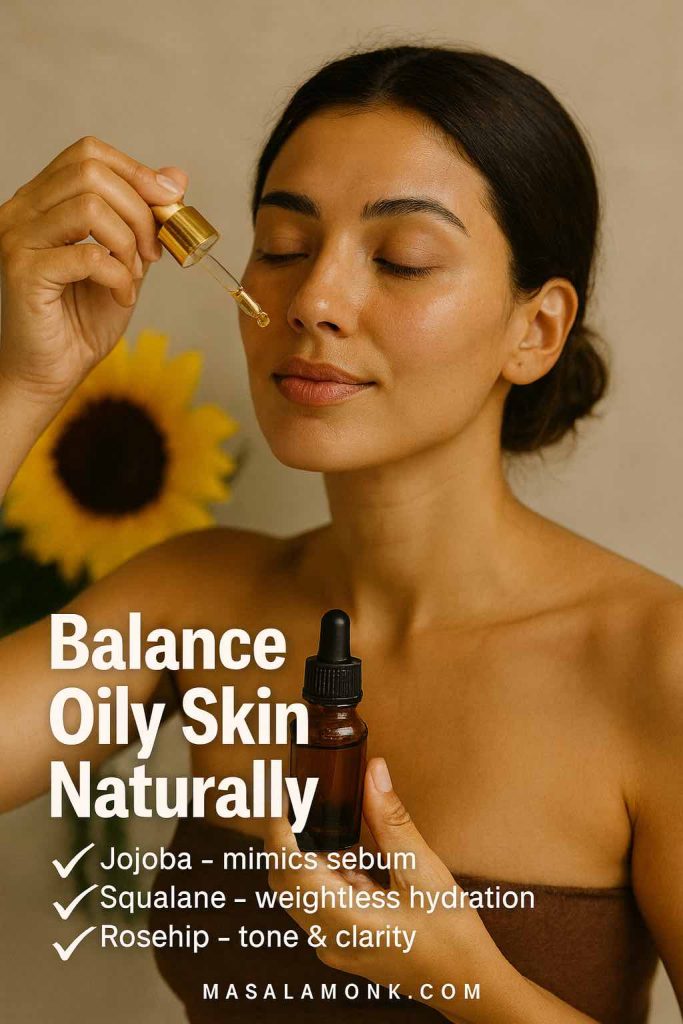
Why these help:
- Jojoba oil mimics sebum, which often reduces midday shine.
- Squalane hydrates weightlessly, so skin doesn’t overcompensate.
- Rosehip oil supports smoother look and tone over time.
- Tea tree essential oil (diluted) is for spot duty only.
AM flow (keep it light):
- Cleanse with a gentle gel.
- Optional niacinamide serum.
- Press 1–2 drops jojoba or squalane over damp skin.
- Matte-friendly SPF.
PM flow (balanced and simple):
- Cleanse; on 2–3 nights/week, use a BHA (salicylic) after cleansing.
- Press 2 drops squalane all over;
- Then tap 1 drop rosehip across areas with uneven tone.
- Dab a pin-prick of tea tree in carrier directly on a blemish (never neat).
Seven-day expectations:
- Day 3: T-zone looks less glassy at noon.
- Week 2: Fewer “sticky” clogged areas; makeup sits better.
Do / Don’t:
- Do apply oils on damp skin so they spread sheer.
- Don’t layer heavy butters on the T-zone.
- Do stick to pea-sized amounts—more is not better.
- Don’t chase every new active while you’re testing oils; change one thing at a time.
Spot blend (safe, tiny): 1 Tbsp jojoba + 6 drops tea tree. Shake; dab with a cotton tip on the blemish once daily max.
Dullness, Uneven Tone, or “I Miss My Vacation Glow” (Radiance + Elasticity)
To revive a flat complexion, combine antioxidants by day and replenishing natural oils for skin at night.
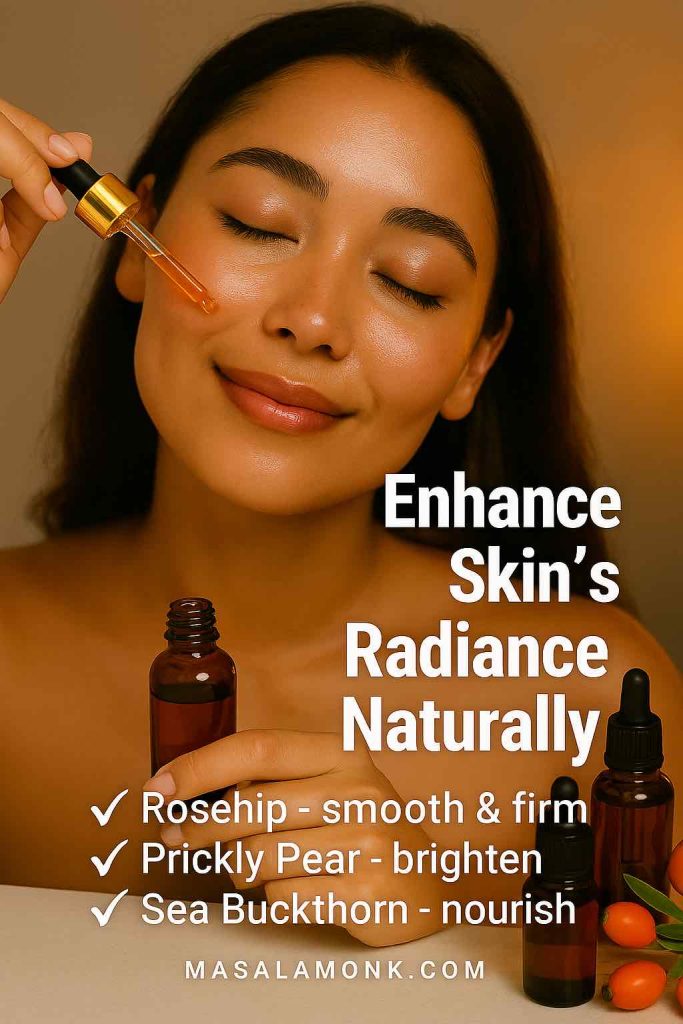
Why these help:
- Rosehip gently supports tone/texture.
- Sea buckthorn brings carotenoids for a healthy, cushy glow.
- Prickly pear seed delivers silk and bounce around eyes and fine lines.
AM flow (bright but calm):
- Cleanse or rinse.
- Vitamin C or niacinamide serum.
- 1 drop squalane for slip; then SPF.
- Optional: mix ½ drop prickly pear into concealer for a smoother under-eye laydown.
PM flow (glow routine):
- Cleanse.
- Press 2 drops rosehip all over.
- Add the tiniest smear of sea buckthorn (a pin head) into your rosehip in the palms for cheeks; it stains, so go slow.
- Pat 1 drop prickly pear under each eye.
Timeline you can feel:
- Week 2: less “chalky” look; makeup needs less highlighter to come alive.
- Week 4: tone appears more even; fine lines look cushioned.
Do / Don’t:
- Do keep sea buckthorn microscopic—just enough to tint your blend.
- Don’t skip sunscreen; radiance work without SPF is two steps forward, two back.
- Do give it 2–4 weeks; brightness is cumulative.
Glow blend (night): 6 mL rosehip + 3 mL prickly pear + 1 mL sea buckthorn. Two drops max; protect your pillowcase.
Very Dry Body Skin That “Drinks Lotion and Still Wants Dessert” (Seal + Soften)
For thirsty limbs, the secret is layering water, then natural body oil, then a seal. Consequently, you wake up satin-soft.
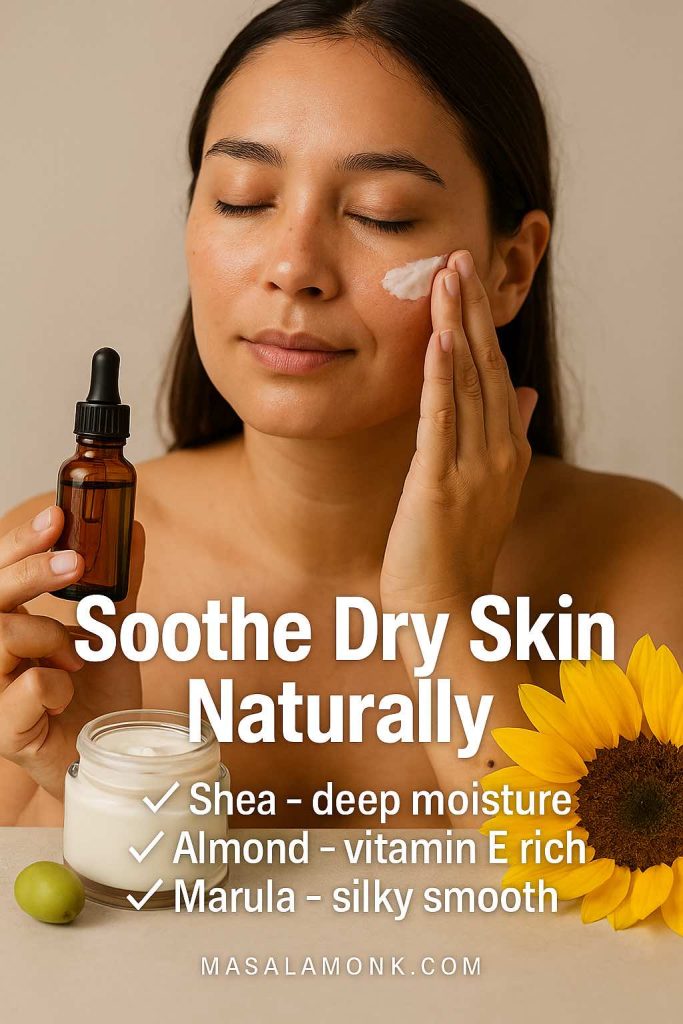
Why these help:
- Sunflower seed oil spreads easily and feeds the barrier.
- Shea or cocoa butter lock in the comfort for hours.
- Lanolin rescues cracks overnight.
After-shower flow (takes 90 seconds):
- End with warm—not hot—water.
- Pat so skin is damp, not dripping.
- Palm-mix 1 tsp sunflower and sweep over legs, arms, torso.
- Follow with a thin veil of shea or cocoa over the driest zones.
- Dab lanolin on heels, cuticles, or knuckles. Pajamas on.
Weekly rhythm that works:
- Do the full stack nightly for 5–7 nights.
- Then maintain 3–4 nights/week, or just on cold/windy days.
Do / Don’t:
- Do switch to cotton or bamboo PJs—they help oils stay on you, not your sheets.
- Don’t scald skin in the shower; heat steals moisture.
- Do exfoliate gently (washcloth or soft mitt) once weekly so oils can sink in.
Body butter cloud (easy DIY): Equal parts melted shea + cocoa + a splash of babassu; whip as it cools. Apply on damp legs for a velvet finish.
Sensitive Souls Who React to Everything (Reset + Rebuild)
When your skin side-eyes every product, simplicity is medicine. Therefore, reach for the most boring, elegant natural oils for skin and give your barrier two quiet weeks.
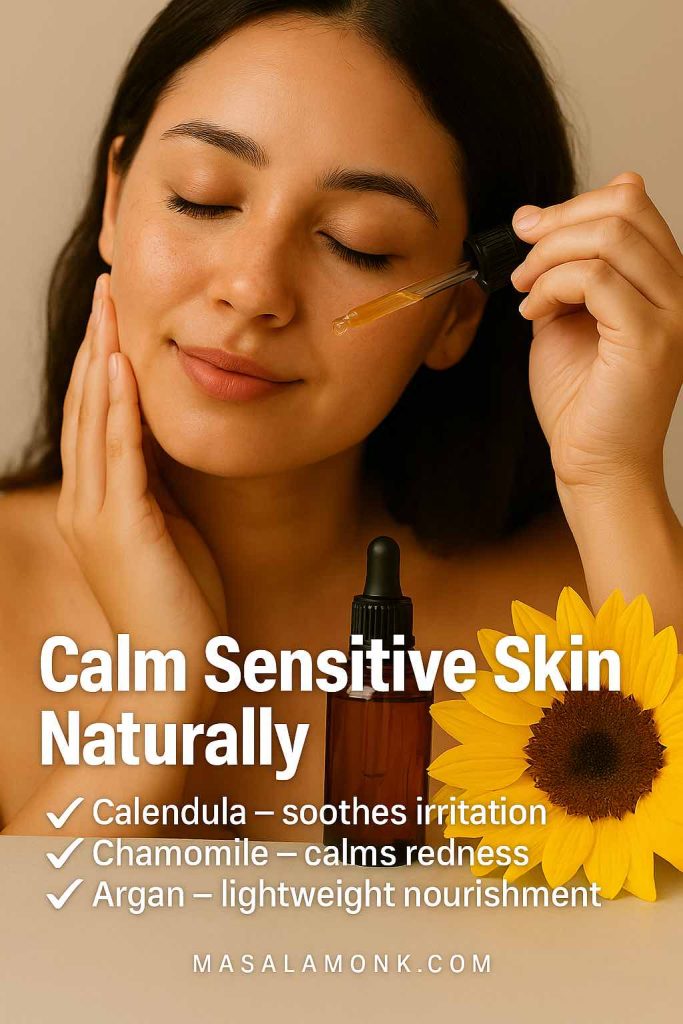
Why these help:
- Squalane is famously inert and comfy.
- Sunflower is light, baby-safe, and barrier-friendly.
- Calendula can be introduced later for extra calm.
Two-week reset (yes, it’s minimal):
- AM: Lukewarm rinse → 2 drops squalane on damp skin → SPF.
- PM: Gentle cleanse → 2–3 drops sunflower (or squalane again) → optional bland cream.
After week 2:
- If skin is steadier, add calendula at 20% into sunflower every other night.
- If things stay calm, test a single new step (like niacinamide) for another two weeks.
Do / Don’t:
- Do patch test new oils behind the ear for two nights first.
- Don’t stack fragrance or essential oils on the face during a reset.
- Do log changes (what/when), so you can spot patterns.
- Don’t judge your skin in overhead office lighting—no one looks good there.
Comfort blend (ultra-simple): 9 mL squalane + 9 mL sunflower. Shake; use 2–3 drops AM/PM.
Quick Reference: Matching Concerns to Natural Oils for Skin
- Eczema/dermatitis: sunflower, squalane, calendula; lanolin on cracks.
- Oily/large pores: jojoba, squalane, rosehip; tea tree (diluted) for spots.
- Dull/uneven tone: rosehip + a whisper of sea buckthorn; prickly pear under eyes.
- Very dry body: sunflower base + shea/cocoa seal; lanolin on heels/hands.
- Ultra-sensitive: squalane or sunflower for two quiet weeks; add calendula later.
These aren’t strict rules; they’re starting points. Your skin will tell you what it likes—especially when you change just one thing at a time.
Little Nudge
Because routines only work when you actually do them, choose one concern and one tiny change from above. For example, try jojoba at night for shine control, or go all-in on that sunflower-plus-shea stack for body softness. Then, reassess in a week. If you’re calmer, softer, or glowier, you’re winning.
Exactly how to apply natural oils for skin so they feel like a treat (not a film)
- Add water first. Mist, toner, or just leave skin slightly damp from cleansing.
- Use the “pea test.” Start with 2–4 drops for the face, a teaspoon for the body.
- Press, don’t rub. Warm between your palms, then press over cheeks, forehead, chin.
- Layer logically. Serums → cream → oil at night. In the morning, oil first, then wait a minute before SPF.
- Mix when you want. If straight oil feels heavy, blend 1–2 drops into your moisturizer for a “custom oil-in-cream.”
Moreover, if makeup pills over oil, shift your oil to nights only or reduce the amount. A single drop mixed into foundation can add glow without slip.
Oil cleansing (the five-minute reset)
Makeup heavy day? Sunscreen layered? Here’s a gentle reset that doesn’t strip:
- Massage 1 tsp jojoba or olive over your dry face for a full 60 seconds.
- Wet hands and keep massaging to lightly emulsify.
- Remove with a warm, wrung-out cloth.
- Optionally follow with a tiny amount of your regular cleanser (double cleanse).
- Finish with a mist + your favorite light oil (squalane is perfect).
You’ll feel clean, soft, and strangely peaceful.
Tiny recipes (fast, safe, easy to love)
- Balancing face drops: 6 mL squalane + 6 mL jojoba + 3 mL rosehip (optional +3 mL prickly pear).
- Comfort oil for red cheeks: 8 mL sunflower + 6 mL squalane + 6 mL calendula macerate.
- Body butter cloud: Equal parts melted shea + cocoa + a splash of babassu; whip as it cools.
- Spot-only blemish dab: 1 Tbsp jojoba + 6 drops tea tree (~1%): dab once daily max. For essential-oil safety, keep face leave-ons around 0.5–1%; body up to ~2%; and spot treatments up to ~5% on tiny areas. (Tisserand Institute — Essential-oil dilution chart).
Patch test new mixes behind the ear or on inner forearm for 2–3 nights. If it stays quiet, you’re good. (DermNet — Open application (ROAT) test)
Safety & smart habits (because “natural” still needs nuance)
Dilution matters: Follow conservative essential-oil dilutions; be mindful that expressed citrus oils (e.g., lemon/lime) can be phototoxic on sun-exposed skin unless below thresholds or furanocoumarin-free. (Tisserand Institute — Phototoxicity: essential oils, sun & safety; IFRA/RIFM — Guidance for IFRA Standards)
SPF is non-negotiable: Use a broad-spectrum SPF 30+ daily; oils are not sunscreen. (American Academy of Dermatology — How to select a sunscreen)
Lanolin & nut oils: Excellent occlusives, but patch-test if you’re sensitive or allergic. (DermNet — Lanolin contact reactions).
Troubleshooting (real skin, real fixes)
- Still dry? Add a water step before oil (mist or hydrating serum), then consider sealing with a cream on top.
- Too shiny? Cut your amount in half and switch to squalane or jojoba. Apply on damp skin so it spreads thin.
- Breaking out? Pause heavier oils (coconut, butters). Use squalane solo for two weeks, then reintroduce one oil at the perimeter first.
- Makeup won’t sit? Keep oils for night; by day, use one drop mixed into foundation or apply oil 10–15 minutes before SPF.
- Eczema flare? Simplify. Sunflower + calendula on damp skin; tiny dot of lanolin where cracked. Give it consistent nights for a week.
Routines you can copy (AM/PM, one week to calmer skin)
The Minimalist (all skin types):
- AM: Rinse → serum (if you like) → 2 drops squalane → SPF.
- PM: Gentle cleanse → 2 drops rosehip or marula → cream if needed.
The Balancer (oily/large pores):
- AM: Cleanse → niacinamide → 2 drops jojoba → SPF.
- PM: Cleanse → BHA 2–3x/week → 2 drops squalane → spot tea tree diluted if needed.
The Comforter (sensitive/eczema-prone):
- AM: Lukewarm water → 2 drops squalane → SPF.
- PM: Short shower → sunflower + calendula on damp face/body → lanolin dot on cracks.
The Glow Seeker (dull/uneven):
- AM: Cleanse → vitamin C → 1 drop squalane → SPF.
- PM: Cleanse → 2 drops rosehip + a whisper of sea buckthorn → cream.
Myths, kindly debunked (and why they matter)
- “Oil replaces moisturizer.” Sometimes, but not always. Oils seal; moisturizers hydrate. Dry-dehydrated skin often loves both.
- “All oils clog pores.” Not true. Jojoba, squalane, and rosehip are generally friendly; coconut and thick butters can be risky on acne-prone faces.
- “Carrot seed oil is sunscreen.” It is not. It’s an antioxidant add-in, not UV protection. Wear SPF.
- “Natural means safe for everyone.” Also not true. Nature is potent. Patch testing keeps you in the “ahh” zone, not the “oh no” zone.
Extra credit: thoughtful add-ons & pairings
- Rosewater (organic) + oil: Mist first, then oil. The glow is immediate yet soft.
- Beeswax (for balms): Add a small amount to create a salve for elbows and heels; it locks in oil and reduces rub-off.
- Lavender essential oil (skin): Pleasant but optional; keep it low if you’re sensitive, or skip entirely.
- Lemon/orange peel oils: Smell lovely yet can irritate; keep to body products at low percentages, and avoid sun post-application on exposed areas.
- Kumkumadi lepam: An Ayurvedic classic featuring saffron; if you try it, patch test and reserve for night to keep things gentle.
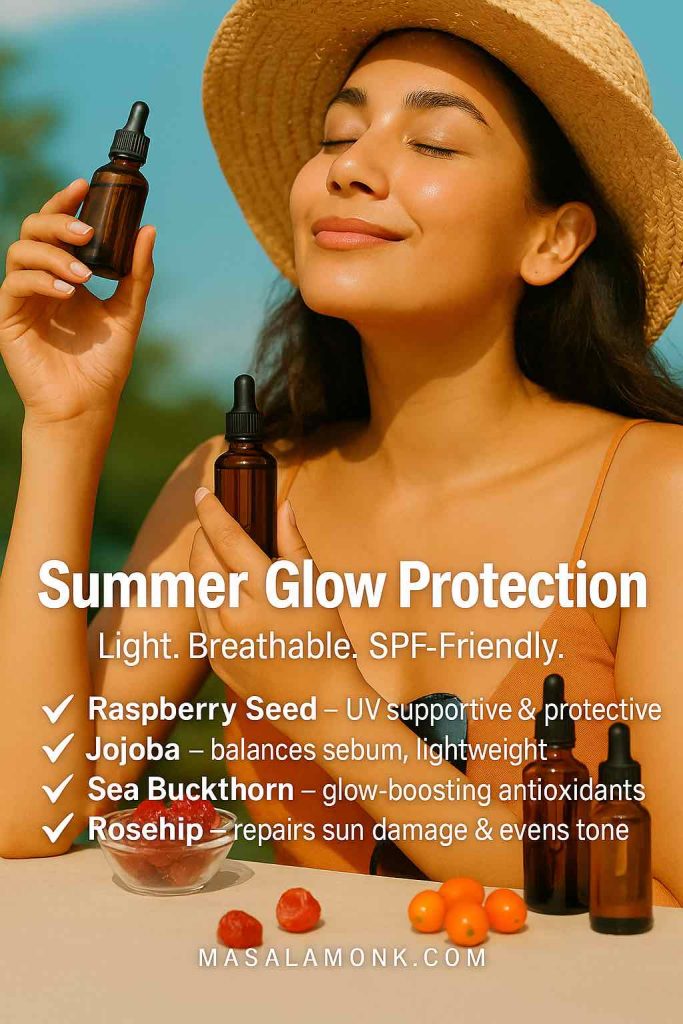
The gentle bottom line on natural oils for skin
You don’t need a 12-step routine to have happy skin. Instead, choose one or two natural oils for skin that fit your current season and your current mood. Maybe it’s squalane in the morning for a weightless, makeup-friendly finish. Perhaps it’s rosehip at night for tone and texture. Or possibly it’s sunflower for the body right after a shower, followed by a little shea or cocoa on the driest spots. Layer water first, then a few drops of oil, then breathe.
Consistency wins. So does kindness. And while this guide covered a lot of ground, your best routine will be the one you’ll actually do—calm, quick, and quietly effective. If you want, tell me your skin type, climate, and what’s already on your shelf; I’ll sketch a 7-day AM/PM plan that uses exactly what you have and plugs in just the right oils.
Your skin will thank you—softly, steadily, and in its own time.


